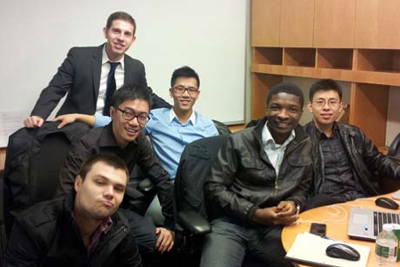Game offers students a taste of real-world trading
By Mark Eisner

Financial engineering students in New York City are steeped in mathematical and technical topics in investment finance, but direct experience with trading the kinds of securities they study is limited.
Levent Kahraman '92 is bridging that gap with a novel trading game he developed and offered to financial engineering master's students spending their third and final semester at Cornell Financial Engineering Manhattan (CFEM). The immersive semester, which the students spend taking classes at CFEM headquarters in the financial district, is the capstone of the financial engineering master's program offered by the School of Operations Research and Information Engineering.
On Nov. 13, students spent an intense evening playing the game at the headquarters of KGS-Alpha Capital Markets, where Kahraman is founder and CEO.
The game split students into teams, with members playing the roles of traders, structuring experts, sales and operations staff. The objective: making money by buying and selling securities to companies -- "counterparties" -- played by KGS staff.
"The game gave a very realistic balance of what can be done numerically and what requires the communication skills that are needed to do well as a trader," said CFEM Director Victoria Averbukh. "I think this game provided many with an eye-opening experience that topped the best trading internship."
To her knowledge, Averbukh added, ORIE's financial engineering program is the only one that offers this type of hands-on experience, thanks to Kahraman.
For the students, playing the game brought feelings of "joy and high adrenaline; it was a very emotional time," said CFEM student Roni Yosofov, who played on team Prime Capital Trading.
Game play centered around email and telephone communication between the teams and "banks," "insurance companies" and "hedge funds," each with different incentives to generate trading volumes and longer-term relationships. KGS-Alpha staffers, located in their own offices, took on the roles and personalities of buyers and sellers.
As the game unfolded, students discovered the importance of communication in a trading environment.
"One of the downsides of learning in a classroom is that you don't necessarily develop the qualitative skills required for a real-world workplace," said student Nikhil Vaidya, a member of team Rulloff's Trading. "The game was a great way to experience the types of problems that salespeople in the markets experience."
Chenru Gong, who played for CFSTrading, discovered that teamwork and cooperation were central to the effort.
"Keep in mind that we only have one decision maker during the game, who is the trader," she said. "The sales people may have their own minds, but following the trader's idea is the key, which led to success."
In the game, determining what price to bid or ask was complicated because the players were not trading conventional stocks and bonds. Instead, they were dealing in securities known as collateralized mortgage obligations.
These securities are "structured products" created by broker-dealers to meet specific needs of investors that cannot be met from standardized financial instruments available in the markets. Unlike stocks, traders must discover prices through communication and analyze them through math.
"Most trading simulations I had played in school and at my first employer looked a lot like stock trading, with transparent pricing," said Chris Vasil, M.Eng. '07. Vasil works for KGS-Alpha and played one of the "hedge funds" in the game. The game "is so different from any other trading simulation, and a good reflection of how structured products work," he said.
Prime Capital Trading won first place with a profit of $2 million and accolades from KGS-Alpha for the best communication with clients. CFSTrading came in second, and Rulloff's Trading took third.
Kahraman, who received undergraduate degrees in economics and civil engineering from Cornell, has "a strong commitment to Cornell," expressed not only through organizing the game but also through spending "a lot of time talking to students about the harsh realities of real life in the securities industry," he said.
"Cornell students already have what it takes vis-a-vis intelligence and integrity," he said. "What some need to work on more than anything else is the ability to connect."
Four Cornell students, including three from ORIE's financial engineering program, will join Kahraman's 130-employee firm in 2013.
"We are extremely happy with the students we are getting from Cornell," Kahraman said. "This should be the beginning of a beautiful relationship."
Mark Eisner is a retired senior lecturer and communications associate with the School of Operations Research and Information Engineering.
Media Contact
Get Cornell news delivered right to your inbox.
Subscribe